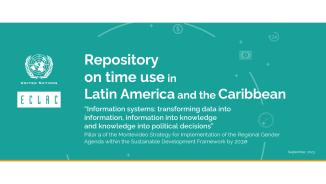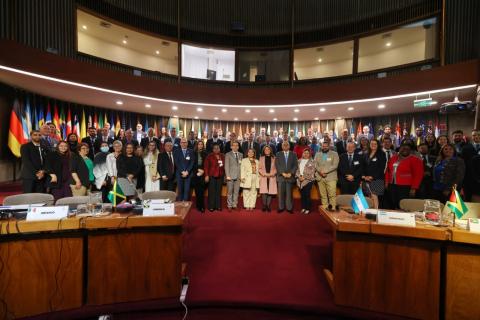infographic
Representatives of Latin American and Caribbean countries’ national statistics offices reaffirmed the importance of generating more and better data for decision-making and thereby giving visibility to the various problems that exist in the region, during the closing session of the twenty-first meeting of the Executive Committee of the Statistical Conference of the Americas, which concluded today at the central headquarters of the Economic Commission for Latin America and the Caribbean (ECLAC) in Santiago, Chile.
The event drew the participation of delegations from 28 of ECLAC’s Member States and 4 associate members, along with representatives of United Nations agencies, funds and programs, international organizations and academia.
In the meeting’s final resolution, which was approved unanimously by the countries present, the Executive Committee of the Statistical Conference of the Americas (SCA) called for continuing to implement the 2020 round of population and housing censuses, taking into account the lessons learned from recent experiences as well as relevant international recommendations and standards to support the production of indicators and statistics that are essential for decision-making.
Furthermore, it stressed the urgency of identifying complementary indicators to GDP for measuring development on issues such as gender gaps and different manifestations of inequalities, unpaid work and the relationship with the environment and its ecosystems, among others.
It also welcomed progress on the development of an information system for the continuous update of the inventory of national capacities to produce the indicators of the Sustainable Development Goals.
The Executive Committee of the SCA expressed appreciation for the efforts made by the Working Groups to mainstream the gender perspective into their work, seeking to contribute to gender equality, the elimination of stereotypes and policymaking by integrating this perspective in the production, analysis and use of statistical information.
In the closing ceremony, Marco Lavagna – Director of the National Institute of Statistics and Censuses (INDEC) of Argentina, the country serving as Chair of the SCA – urged for deepening regional cooperation and collaboration to optimize the work of national statistics offices and make it much more efficient.
Meanwhile, Rolando Ocampo, Director of ECLAC’s Statistics Division, highlighted the meeting’s success and thanked all the entities and experts that made the twenty-first meeting of the SCA’s Executive Committee possible.
At the gathering, participants welcomed the presentation of the document “Breaking the statistical silence to achieve gender equality by 2030” as a joint contribution by the Regional Conference on Women in Latin America and the Caribbean and the Statistical Conference of the Americas for strengthening the production of information on gender inequalities and contributing to the implementation of the Montevideo Strategy for Implementation of the Regional Gender Agenda within the Sustainable Development Framework by 2030.
Finally, they expressed their satisfaction at the progress made on implementation of the 2021 round of the International Comparison Programme in the region and urged countries to continue to address information needs and to move forward in incorporating these tasks into the regular work plans of statistical institutions, applying relevant international recommendations and standards and taking into account the importance of its results in the production of indicators and statistics that are essential for decision-making.
The SCA’s Executive Committee is chaired by Argentina and composed of Canada, Colombia, the Dominican Republic, Grenada, Italy and Jamaica.



